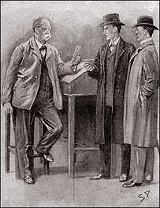In rapid succession we passed through the fringe of fashionable London, hotel London, theatrical London, literary London, commercial London, and, finally, maritime London, till we came to a riverside city of a hundred thousand souls, where the tenement houses swelter and reek with the outcasts of Europe. Here, in a broad thoroughfare, once the abode of wealthy City merchants, we found the sculpture works for which we searched. Outside was a considerable yard full of monumental masonry. Inside was a large room in which fifty workers were carving or moulding. The manager, a big blond German, received us civilly and gave a clear answer to all Holmes’s questions. A reference to his books showed that hundreds of casts had been taken from a marble copy of Devine’s head of Napoleon, but that the three which had been sent to Morse Hudson a year or so before had been half of a batch of six, the other three being sent to Harding Brothers, of Kensington. There was no reason why those six should be different from any of the other casts. He could suggest no possible cause why anyone should wish to destroy them - in fact, he laughed at the idea. Their wholesale price was six shillings, but the retailer would get twelve or more. The cast was taken in two moulds from each side of the face, and then these two profiles of plaster of Paris were joined together to make the complete bust. The work was usually done by Italians, in the room we were in. When finished, the busts were put on a table in the passage to dry, and afterwards stored. That was all he could tell us.
But the production of the photograph had a remarkable effect upon the manager. His face flushed with anger, and his brows knotted over his blue Teutonic eyes.

“Ah, the rascal!” he cried. “Yes, indeed, I know him very well. This has always been a respectable establishment, and the only time that we have ever had the police in it was over this very fellow. It was more than a year ago now. He knifed another Italian in the street, and then he came to the works with the police on his heels, and he was taken here. Beppo was his name -his second name I never knew. Serve me right for engaging a man with such a face. But he was a good workman - one of the best.”
“What did he get?”
“The man lived and he got off with a year. I have no doubt he is out now, but he has not dared to show his nose here. We have a cousin of his here, and I daresay he could tell you where he is.”
“No, no,” cried Holmes, “not a word to the cousin - not a word, I beg of you. The matter is very important, and the farther I go with it, the more important it seems to grow. When you referred in your ledger to the sale of those casts I observed that the date was June 3rd of last year. Could you give me the date when Beppo was arrested?”
“I could tell you roughly by the pay-list,” the manager answered. “Yes, ” he continued, after some turning over of pages, “he was paid last on May 20th.”
“Thank you,” said Holmes. “I don’t think that I need intrude upon your time and patience any more.” With a last word of caution that he should say nothing as to our researches, we turned our faces westward once more.
The afternoon was far advanced before we were able to snatch a hasty luncheon at a restaurant. A news-bill at the entrance announced “Kensington Outrage. Murder by a Madman,” and the contents of the paper showed that Mr. Horace Harker had got his account into print after all. Two columns were occupied with a highly sensational and flowery rendering of the whole incident. Holmes propped it against the cruet-stand and read it while he ate. Once or twice he chuckled.
“This is all right, Watson,” said he. “Listen to this:”